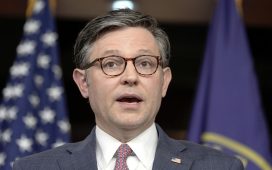Editor’s Note: Morning Transportation is a free version of POLITICO Pro Transportation’s morning newsletter, which is delivered to our subscribers each morning at 6 a.m. The POLITICO Pro platform combines the news you need with tools you can use to take action on the day’s biggest stories. Act on the news with POLITICO Pro.
— Regulating Tesla’s Autopilot has proven a challenge for NHTSA, which has seen its approach criticized by former administrators, federal safety investigators and others.
— Trucking groups are ramping up their opposition to a proposed fee on trucks as a surface transportation pay-for, threatening to kill any bill that includes such a provision.
— The FAA finalized changes to pilot training requirements this week that were inspired by deadly crashes in the 2000s.
IT’S TUESDAY: Thanks for tuning in to POLITICO’s Morning Transportation, your daily tipsheet on all things trains, planes, automobiles and ports. Get in touch with tips and feedback at smintz@politico.com or @samjmintz.
LISTEN HERE: Follow MT’s playlist on Spotify. What better way to start your day than with songs (picked by us and readers) about roads, railways, rivers and runways?
REGULATING TESLA’S AUTOPILOT: Ahead of an NTSB meeting this afternoon that’s expected to further scrutinize Tesla’s Autopilot system and the way it’s regulated, our team looked at how DOT’s failure to get a handle on Autopilot raises questions about whether it’s up to the task of ensuring safety as vehicles become increasingly automated.
As Tanya Snyder and your host write, criticism of NHTSA, the subagency within DOT tasked with vehicle safety, has come from many quarters, including federal safety investigators at the independent NTSB, who say DOT’s response to concerns about Autopilot is not adequate.
Strong quotes: Former NHTSA Administrator Joan Claybrook said the agency has “failed to regulate” on Autopilot. And the NTSB’s director of highway safety, Robert Molloy, said the quickly developing world of vehicle automation “begs for leadership from NHTSA.”
If history is any guide: NHTSA will continue to ignore a key recommendation from NTSB to implement safeguards to ensure that automation features are only used under appropriate conditions. NHTSA instead has pointed to its existing voluntary guidance (which also doesn’t cover partially automated systems like those in Teslas). “That is a response we hope they reconsider,” Molloy said.
What NHTSA could be doing: The agency could use its defect authority to examine whether consumers are misusing Autopilot in a way that’s predictable. The definition of a performance defect can include technology that works fine when used exactly as intended, but is dangerous when misused in a “foreseeable” way — which is a major concern with Autopilot. Dozens of videos and other accounts have emerged of drivers using the system in ways that Tesla itself said are unsafe.
A lack of public clarity: NHTSA has been so quiet about what it is or isn’t doing in regards to Tesla that even some experts in how the agency operates are confused. David Friedman, a former acting administrator now at Consumer Reports, said the agency has subpoenaed Tesla for information about crashes and sent out special crash investigation teams, which he said are in line with what would be involved with an Engineering Analysis, an official stage of a defect investigation.
But the agency hasn’t even formally said it’s doing a Preliminary Evaluation, an earlier stage of such an investigation. “It’s clear that they’re investigating, but they don’t seem to be actually calling it an official investigation,” Friedman said. “That to me flags, is the staff trying to do the right thing, but at some level they’re getting some pressure to not do it in a big public manner?”
TRUCKING GROUPS ON EDGE OVER POTENTIAL TARGETED PAY-FOR: The debate over how to fund a Senate surface transportation bill is dividing transportation advocacy groups that often find themselves on the same side of the ring. The American Road and Transportation Builders Association has urged its members to support a three-pronged revenue approach, which includes indexing the federal gas tax, introducing a new electric vehicle fee, and issuing a vehicle miles traveled fee on heavy commercial trucks.
That last one is a no-go for the trucking industry, and associations representing truckers are threatening to kill any bill that includes it. The Owner-Operator Independent Drivers Association called ARTBA’s proposal “shameless” and “arrogant” in a letter to lawmakers sent Monday. “The inclusion of such a divisive, inefficient and unabashedly self-serving policy in the next surface transportation reauthorization would instantly eliminate our support for the bill and likely destroy any hope for its passage,” wrote the group, which represents independent truckers.
As we reported earlier this month, those three funding solutions (including a truck tax) are being examined by GOP Senators looking for revenue for their bill.
ARTBA’s senior vice president of congressional relations, Dean Franks, defended the proposal in a statement to MT. “Ad hominem attacks and gratuitous potshots won’t change the fact there is a looming $67 billion shortfall in the Highway Trust Fund — and that’s just to maintain current federal highway and transit investment levels to the states,” he said. Franks said ARTBA will “continue to explore any user-based revenue option that will gain traction on Capitol Hill.”
FAA TWEAKS PILOT TRAINING REQUIREMENTS: The FAA has a final rule coming out today that requires airlines to update their pilot training programs. It mandates that airlines give newly hired pilots the chance to observe flight operations and get familiar with procedures before actually serving on a flight. Carriers also must update training curriculum for pilots looking to upgrade from first officer to captain, and offer leadership and mentoring training for captains. The FAA expects the rule to “mitigate incidents of unprofessional pilot behavior and reduce pilot errors that can lead to a catastrophic event.”
After the deadly Colgan Air crash in 2009, Congress enacted a law that, among many other things, required the FAA to form an aviation rulemaking committee on pilot mentoring and leadership, and write a rule in response to the committee’s recommendations. NTSB investigators found that “inadequate leadership in the flight deck, pilots’ unprofessional behavior, and pilots’ failure to comply with the sterile flight deck rule” were factors in the Colgan crash and other accidents.
The Regional Airline Association is “very supportive of the requirements — our members have many of the standards in place already,” Faye Malarkey Black, the group’s head, said in a statement.
The changes are also supported by the pilots union ALPA. “These collective efforts help to ensure that this highly-trained and skilled workforce continues to play a crucial role in maintaining our nation’s impeccable aviation safety record,” ALPA wrote in a statement.
FOR YOUR RADAR: TSA Chief Counsel Francine Kerner is suing DHS and its IG over the publication of a 2018 report on an employee misconduct investigation that she claims erroneously accused her of misusing her authority. Kerner was one of three TSA officials the IG said interfered in a 2015 disciplinary process for a senior official who had been recommended for removal but was instead suspended and reassigned following an accusation of sexual misconduct. She filed the lawsuit at a U.S. district court in Virginia last month.
Kerner says the IG violated her privacy and due process rights by publishing information about her in the report that was protected by the Privacy Act without her consent. She said the report included “untested” and “inaccurate” allegations in an attempt to “shift the blame” away from Gen. Francis Taylor, who was then acting TSA administrator. We covered the IG report in 2018. And our Stephanie Beasley’s subsequent coverage of a Senate hearing, during which former Sen. Claire McCaskill (D-Mo.) called for Kerner’s removal from the agency, was mentioned in the lawsuit. Kerner has been in her position since 2002.
IT’S OFFICIAL: Amtrak is making its cheapest tickets nonchangeable and nonrefundable — another move toward an airline-style business model that has seen the railroad serve prepackaged meals and introduce cancellation penalties, The Washington Post reports. A memo describing the planned changes was first unearthed by Business Insider in December.
Standard fares on the railroad will also have penalties for cancellations or changes. Amtrak officials told the Post they expect the new change and cancellation fees will mean about $10 million dollars a year in additional revenue.
Boeing’s board nominated Qualcomm CEO Steve Mollenkopf and former United Technologies Corporation Chief Financial Officer Akhil Johri to be members. In a statement, Boeing Chairman Larry Kellner said the two “will bring significant additional safety, engineering, software and financial experience” to the board.
Current board members Edward Liddy and Mike Zafirovski are retiring. Liddy has hit the board’s mandatory retirement age, and Zafirovski has chosen not to stand for reelection. Liddy was a member of the panel that reviewed Boeing’s design and development processes after the 737 MAX crashes.
— “Boeing scours idle 737 MAX plant for industrial snags.” Reuters.
— “German man drives car into Carnival crowd, injures 30.” Associated Press.
— “Steep budget cuts left Alaska with only one operating mainline ferry. Then it broke down.” Washington Post.
— “Trump faces ‘black swan’ threat to the economy and reelection.” POLITICO.
— “Vanessa Bryant files wrongful death suit against helicopter operator in Kobe Bryant crash.” Los Angeles Times.
— “A cobalt crisis could put the brakes on electric car sales.” Wired.
— “U.S. FAA agrees to pay $90,000 to whistleblower who disclosed unqualified flight safety inspectors.” Reuters.
DOT appropriations run out in 218 days. The FAA reauthorization expires in 1,315 days. Highway and transit policy is up for renewal in 218 days.









